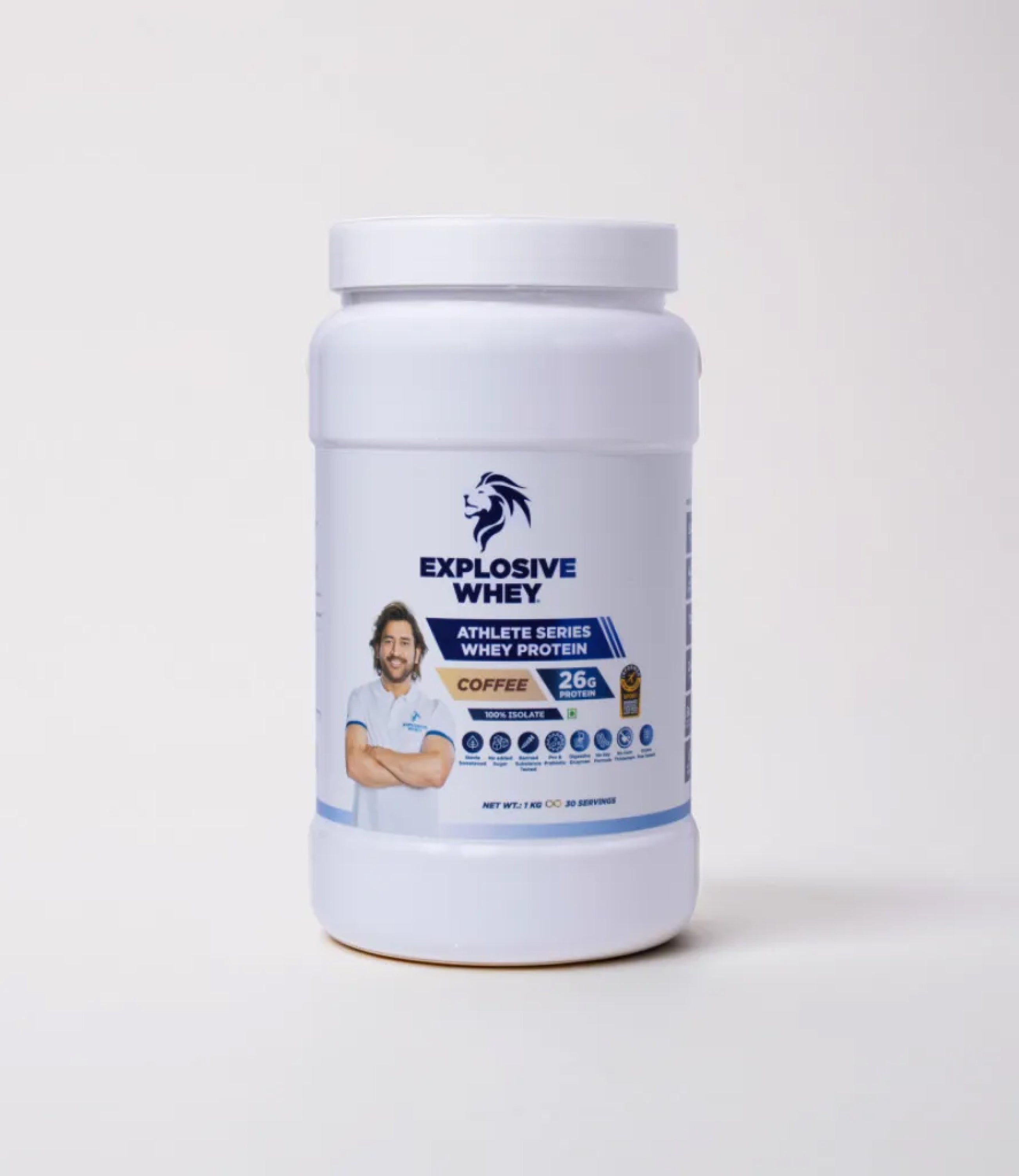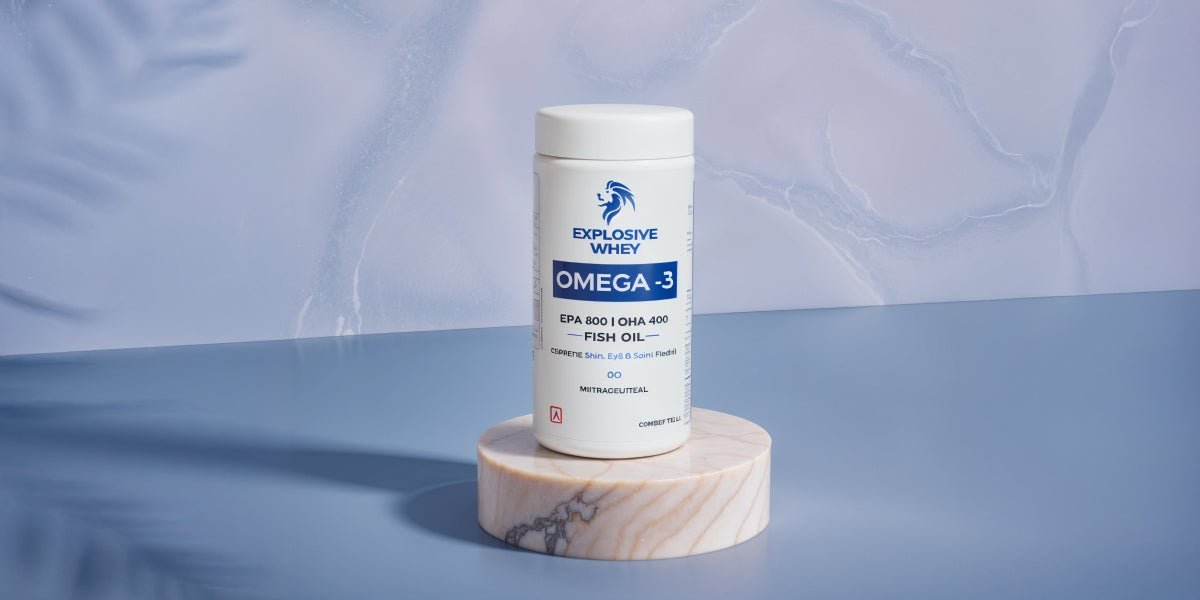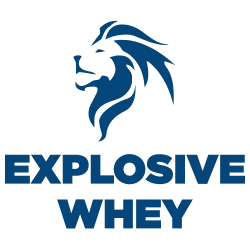For athletes, maintaining peak performance, reducing recovery time, and boosting endurance are crucial. One powerful tool to help with all of these aspects is Omega-3 fatty acids. These essential fats not only support heart and brain health but also play a vital role in reducing inflammation, enhancing muscle recovery, and boosting overall athletic performance. Let's dive into the importance of Omega-3 for athletes and how it can help you reach your fitness goals.
Maximize Recovery and Endurance with Omega-3
Omega-3 fatty acids are well-known for their broad range of health benefits, from supporting brain function to promoting heart health. But what many athletes may not know is how Omega-3 can drastically improve recovery, endurance, and joint health—making it a must-have in any athlete's diet.
What is Omega-3?

Omega-3 fatty acids are a group of polyunsaturated fats that are essential to the body, meaning they must be obtained through diet or supplements. These fats play a critical role in cellular function and are particularly beneficial for athletes who experience physical stress on the body.
Types of Omega-3 Fatty Acids
There are three main types of Omega-3 fatty acids:
- ALA (Alpha-Linolenic Acid): Found primarily in plant-based foods.
- EPA (Eicosapentaenoic Acid): Found in fish and seafood.
- DHA (Docosahexaenoic Acid): Found in fish and is essential for brain and muscle function.
Why Omega-3 is Crucial for Athletes?

Omega-3 plays a vital role in optimizing athletic performance by reducing inflammation, enhancing endurance, and speeding up recovery. For athletes, this is particularly important as rigorous training often leads to muscle soreness and inflammation. Omega-3 fatty acids also improve oxygen delivery to muscles during exercise, making them essential for athletes looking to improve performance and recovery.
Reduction of Inflammation & Muscle Soreness
Athletes often deal with inflammation, muscle soreness, and joint pain after intense workouts. Omega-3 fatty acids, particularly EPA and DHA, are proven to reduce inflammation, making them excellent for post-exercise recovery. By reducing muscle damage, Omega-3 helps athletes recover faster and train harder.
Omega-3 Benefits for Athletes
The benefits of Omega-3 for athletes go beyond reducing inflammation. These essential fatty acids boost cardiovascular health, improve joint flexibility, and enhance stamina. By reducing oxidative stress and improving blood flow, Omega-3s also support quicker muscle recovery, allowing athletes to train harder and longer with less fatigue. Omega-3s are also linked to improved cognitive function, which helps athletes stay focused and mentally sharp.
Enhancing Recovery
Omega-3s help accelerate the recovery process after intense physical activity. They reduce muscle soreness, allowing athletes to get back to their training routines quicker without risking injury or prolonged fatigue.
Boosting Endurance and Stamina
Omega-3 fatty acids are known to improve oxygen delivery during endurance activities. This leads to better stamina, making it easier for athletes to sustain longer workouts, whether they are running, cycling, or strength training.
Joint Health and Flexibility
For athletes, joint health is critical to maintaining performance. Omega-3s help to keep joints lubricated, reduce inflammation, and prevent stiffness, ensuring flexibility and range of motion are preserved even after rigorous physical activity.
Top Omega-3 Fatty Acid Sources

Marine Sources:
- Fatty fish like salmon, mackerel, and sardines
- These sources are highly recommended for their direct benefits in improving athletic performance.
Plant-Based Sources:
- Chia seeds, flaxseeds, and walnuts
- It is ideal for athletes following a plant-based or vegan diet.
Omega-3 Rich Foods for Athletes
Incorporating Omega-3 into your diet is easier than you might think, especially with the abundance of Omega-3-rich foods available.
Fatty Fish (Salmon, Mackerel, Sardines)
Fatty fish are among the best sources of Omega-3 fatty acids, especially EPA and DHA. Including fish like salmon, mackerel, and sardines in your meals can significantly boost your Omega-3 intake.
Plant-Based Sources (Chia Seeds, Flaxseeds, Walnuts)
For vegetarian or vegan athletes, plant-based sources such as chia seeds, flaxseeds, and walnuts are rich in ALA, another beneficial form of Omega-3. However, it’s important to note that ALA needs to be converted into EPA and DHA by the body.
Omega-3 Supplements for Athletes

Supplements are a convenient option for athletes who struggle to get enough Omega-3 from food alone. Omega-3 supplements, particularly fish oil capsules, are widely available and can help bridge any nutritional gaps. When choosing a supplement, athletes should look for high-quality options with optimal concentrations of EPA and DHA. Integrating Omega-3 supplements into a balanced diet can enhance their recovery and performance benefits.
Choosing the Best Omega-3 Supplements
If you're not getting enough Omega-3 from your diet, supplements can be a convenient and effective option. When selecting Omega-3 supplements, look for high-quality fish oil capsules or algae-based supplements for a plant-based alternative. Opt for those that contain both EPA and DHA for maximum benefits.
How to Incorporate Omega-3 Supplements into Your Diet
Omega-3 supplements can easily be integrated into your daily routine. For optimal absorption, it's best to take Omega-3 supplements with meals that contain healthy fats. Always consult with a healthcare professional to ensure you’re taking the right dosage for your individual needs.
Potential Risks and Considerations
While Omega-3 supplements offer numerous benefits, it's important to be mindful of the dosage. Excessive consumption can lead to blood thinning, which may be a concern for athletes involved in contact sports. Consulting with a healthcare professional is advised to ensure the correct dosage for individual needs. Additionally, some supplements may contain impurities, so it’s essential to choose trusted, high-quality brands to avoid contaminants like mercury.
Understanding Omega-3 Dosage Limits
While Omega-3 supplements offer numerous benefits, it’s important to stay within the recommended daily intake to avoid potential side effects such as blood thinning. Athletes should aim for a dosage that balances their dietary intake with supplementation, typically around 250–500 mg of combined EPA and DHA per day.
Incorporating Omega-3 into your diet is a game-changer for athletes. Whether through food sources like fatty fish or high-quality Omega-3 supplements, these essential fatty acids will support your recovery, endurance, and overall performance. Take control of your athletic health by making Omega-3 a regular part of your nutrition plan.
FAQs
Q1) How quickly can athletes expect to see results from Omega-3?
Athletes may start noticing benefits from Omega-3 supplementation within 2 to 4 weeks of consistent intake. The reduction in inflammation and improved recovery can become evident after a few weeks, although long-term benefits like enhanced endurance and joint health may take a bit longer to fully materialize.
Q2) Can Omega-3 supplements replace natural sources?
While Omega-3 supplements are a convenient option, they shouldn't entirely replace natural sources. Whole foods like fatty fish, flaxseeds, and chia seeds offer additional nutrients that supplements don't. It's best to use supplements as a complement to a balanced diet rich in Omega-3 foods.
Q3) Are there any specific Omega-3 supplements recommended for athletes?
For athletes, fish oil supplements that contain both EPA and DHA are ideal due to their potent anti-inflammatory and endurance-boosting properties. Algae-based Omega-3 supplements are also a good alternative for plant-based athletes, as they provide a direct source of DHA and EPA.
Q4) What is the difference between Omega-3 from fish oil and plant sources?
Omega-3 from fish oil contains EPA and DHA, the forms directly used by the body for anti-inflammatory and endurance benefits. Plant-based sources, such as flaxseeds and chia seeds, provide ALA, which the body must convert to EPA and DHA. However, this conversion is not always efficient, so fish oil is typically more beneficial for athletes.










Leave a comment
This site is protected by hCaptcha and the hCaptcha Privacy Policy and Terms of Service apply.